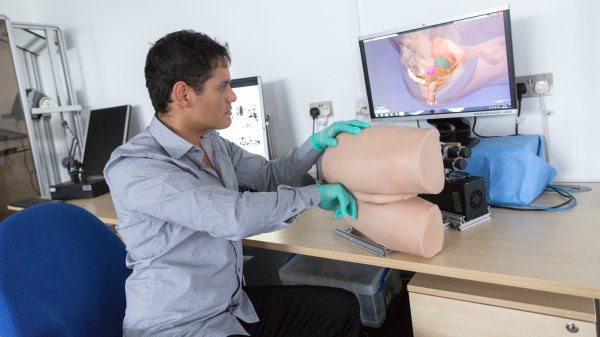
Dr Alejandro Granados from Imperial College London demonstrates
the robotic rectum technology
Excerpts from Medical News Today contained below.
Technology seems to be moving at lightening speed these days. From computers that fit in our hand, to robotic learning tools. It’s a progressive time in our history. This past July, scientists at Imperial College London developed a prosthetic buttocks and rectum to help train doctors and nurses to perform prostate cancer exams.
The idea is the device helps train doctors and nurses to perform rectal examinations by accurately recreating the feel of a rectum, as well as providing feedback on their examination technique. The device contains small robotic arms that apply pressure to the silicone rectum, to recreate the shape and feel of the back passage.
Rectal examinations are necessary to diagnose conditions such as prostate cancer and involve a medic placing their index finger into the anus, and feeling the prostate gland.
Generally, cancerous prostates tend to feel hard and knobbly, but learning exactly what a potentially cancerous prostate feels like can be difficult, explains Dr Fernando Bello, from the Department of Surgery and Cancer at Imperial College London: “Internal examinations are really challenging to learn – and to teach. Because the examinations occur in the body, the trainer cannot see what the trainee is doing, and vice versa. In addition to this, medics rarely get the chance to practise the examination, as few patients would volunteer as practice subjects. In fact there is only one person registered in the country as a test subject, called a Rectal Teaching Assistant (RTA) in the UK.
“But the results of these examinations can have major implications for patients – they are very important for early diagnosis of various conditions such as prostate cancer.”
Although plastic models exist to help train medical staff, these do not feel like living flesh and tissue, added Dr Bello. Therefore to help doctors and nurses practice how to perform these examinations – and to ensure they are as comfortable as possible for patients, Dr Bello and his team have created a robotic ‘trainer rectum’.
When using the trainer, a doctor inserts his finger inside a silicone thimble attached to robotic technology able to recreate the exact sensation of the human rectum.
Furthermore, a computer screen behind the device can display a 3D model of the rectum and prostate, allowing the doctor, with the aid of 3D glasses, to see the anatomy while they perform the examination. The technology can be programmed for different scenarios, allowing the anatomy to be changed each time, explained Dr Alejandro Granados, also from the Department of Surgery and Cancer at Imperial and who is leading the development of the robotic rectum.
He added: “We have already asked a number of doctors and nurses – including prostate specialists and cancer surgeons – to trial the technology. They commented on the great advantage of being able to alter the anatomy. The size and shape of the rectum and prostate can vary greatly from person to person, and this technology enables medics to practice their skills in many different virtual patients. They also observed that because these examinations are performed solely by feel, experiencing a realistic sensation is crucial.”
Furthermore, the team are continuing to perfect the device, by collecting data from real prostate examinations in patients.

